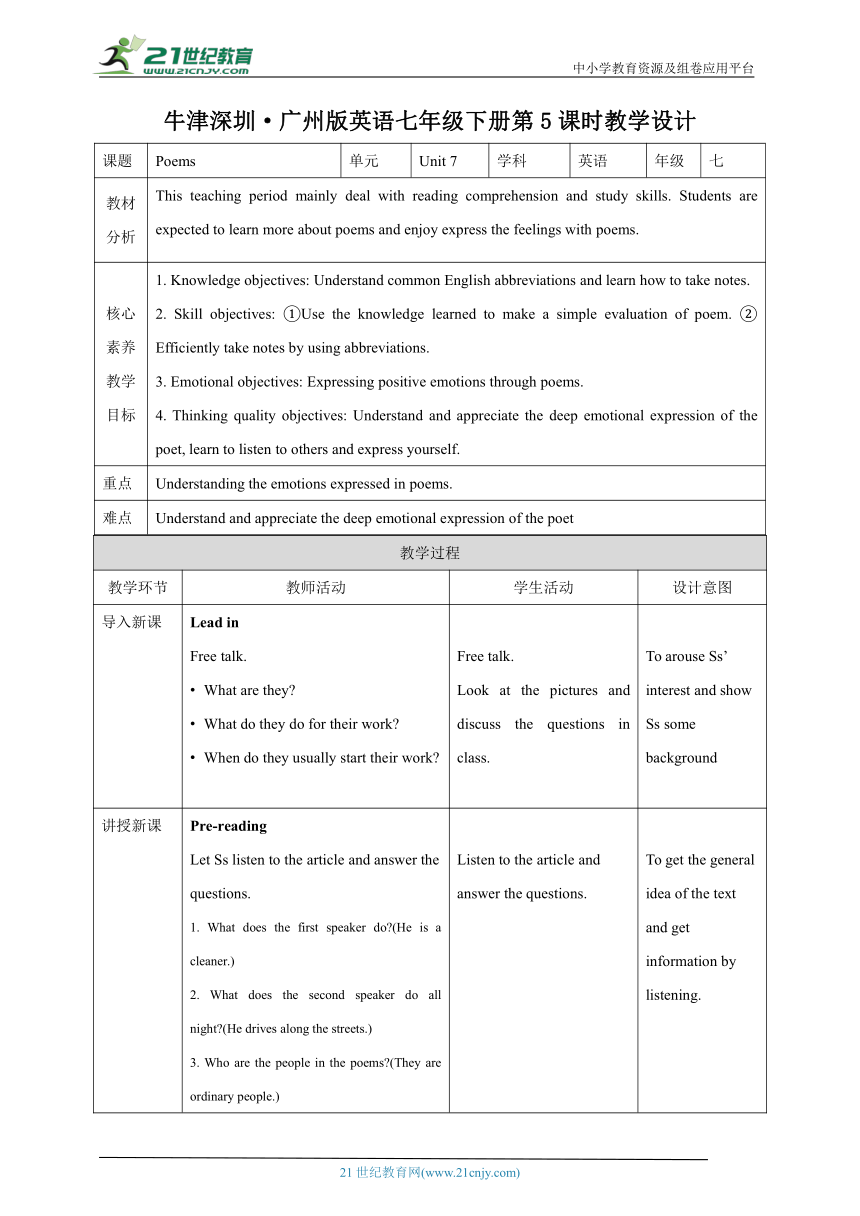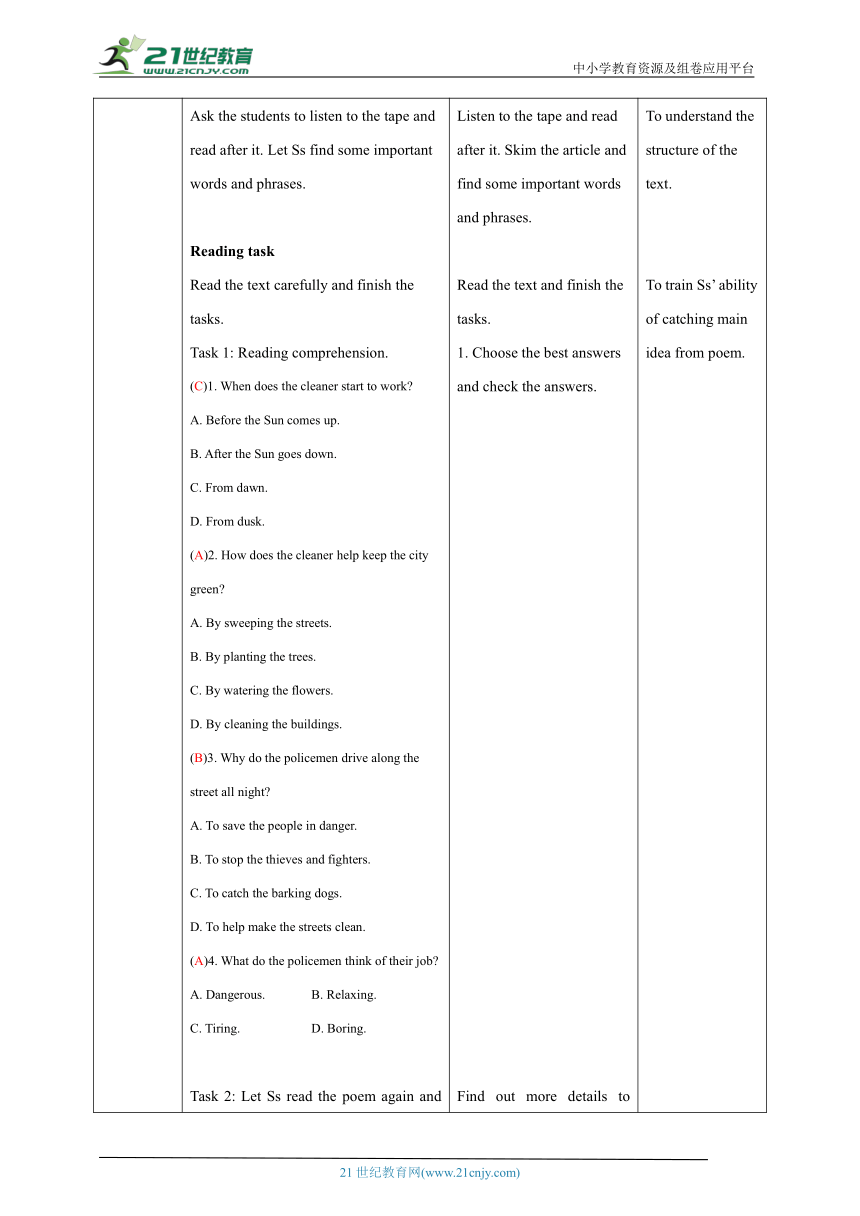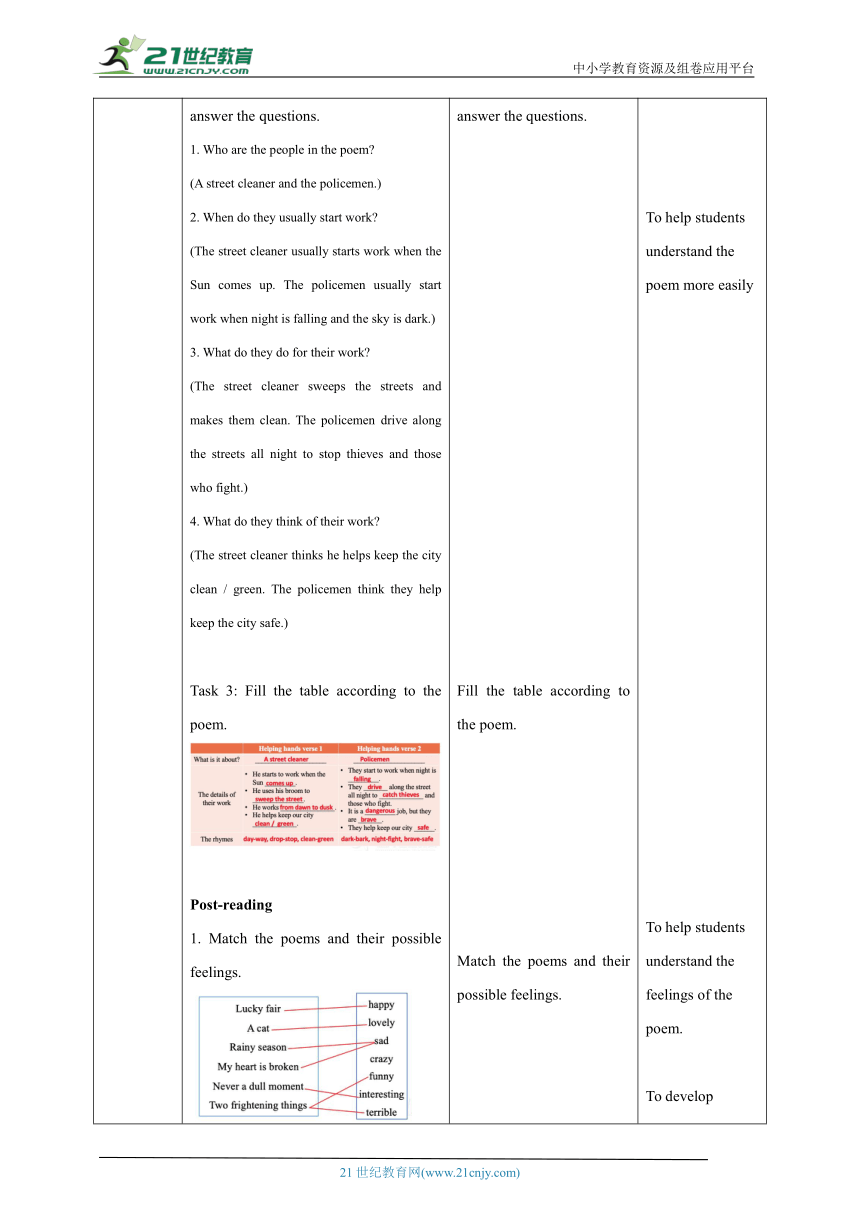【核心素养目标】Unit 7 Poems 第5课时More practice, Culture corner & Study skills教案
文档属性
| 名称 | 【核心素养目标】Unit 7 Poems 第5课时More practice, Culture corner & Study skills教案 |  | |
| 格式 | doc | ||
| 文件大小 | 1.3MB | ||
| 资源类型 | 试卷 | ||
| 版本资源 | 牛津深圳版 | ||
| 科目 | 英语 | ||
| 更新时间 | 2023-05-05 15:19:27 | ||
图片预览



文档简介
中小学教育资源及组卷应用平台
牛津深圳·广州版英语七年级下册第5课时教学设计
课题 Poems 单元 Unit 7 学科 英语 年级 七
教材分析 This teaching period mainly deal with reading comprehension and study skills. Students are expected to learn more about poems and enjoy express the feelings with poems.
核心素养教学目标 1. Knowledge objectives: Understand common English abbreviations and learn how to take notes. 2. Skill objectives: ①Use the knowledge learned to make a simple evaluation of poem. ② Efficiently take notes by using abbreviations.3. Emotional objectives: Expressing positive emotions through poems.4. Thinking quality objectives: Understand and appreciate the deep emotional expression of the poet, learn to listen to others and express yourself.
重点 Understanding the emotions expressed in poems.
难点 Understand and appreciate the deep emotional expression of the poet
教学过程
教学环节 教师活动 学生活动 设计意图
导入新课 Lead inFree talk.What are they What do they do for their work When do they usually start their work Free talk.Look at the pictures and discuss the questions in class. To arouse Ss’ interest and show Ss some background
讲授新课 Pre-readingLet Ss listen to the article and answer the questions. 1. What does the first speaker do (He is a cleaner.)2. What does the second speaker do all night (He drives along the streets.)3. Who are the people in the poems (They are ordinary people.)Ask the students to listen to the tape and read after it. Let Ss find some important words and phrases.Reading taskRead the text carefully and finish the tasks.Task 1: Reading comprehension.(C)1. When does the cleaner start to work A. Before the Sun comes up. B. After the Sun goes down.C. From dawn. D. From dusk.(A)2. How does the cleaner help keep the city green A. By sweeping the streets. B. By planting the trees.C. By watering the flowers. D. By cleaning the buildings.(B)3. Why do the policemen drive along the street all night A. To save the people in danger. B. To stop the thieves and fighters.C. To catch the barking dogs. D. To help make the streets clean.(A)4. What do the policemen think of their job A. Dangerous. B. Relaxing. C. Tiring. D. Boring.Task 2: Let Ss read the poem again and answer the questions.1. Who are the people in the poem (A street cleaner and the policemen.)2. When do they usually start work (The street cleaner usually starts work when the Sun comes up. The policemen usually start work when night is falling and the sky is dark.)3. What do they do for their work (The street cleaner sweeps the streets and makes them clean. The policemen drive along the streets all night to stop thieves and those who fight.)4. What do they think of their work (The street cleaner thinks he helps keep the city clean / green. The policemen think they help keep the city safe.)Task 3: Fill the table according to the poem.Post-reading1. Match the poems and their possible feelings.2. In groups, discuss what you think of their work.Language pointsLead the Ss to learn the language points.1. from dawn to dusk2. make sb. + adj.Exercise Summarize the key phrases.Key words: broom, dawn, dusk, sweep, thief, braveKey phrases: come up, from dawn to dusk, on my way, make sb./sth. + adj., keep sb./sth. + adj.Study skillsIntroduce the skill to students. 1. Show students some abbreviations and lead them to understand what they stand for.2. Let students know that we can use abbreviations to take notes or do other jobs efficiently.3. Have a go. Lead students to do some exercise about abbreviations.Culture cornerTalk about Libai who was a famous ancient Chinese poet. Read a poem written by Libai and understand the feelings of the poem.Show students two versions of the poem--- English version and Chinese version.DiscussWhich version of the poem do you prefer The Chinese one or the English one Give your reasons.Watch a video. Help students understand what foreigners think of Chinese poems and poets. Listen to the article and answer the questions.Listen to the tape and read after it. Skim the article and find some important words and phrases.Read the text and finish the tasks.1. Choose the best answers and check the answers.Find out more details to answer the questions.Fill the table according to the poem.Match the poems and their possible feelings.Discuss in groups:What do you think of their work in this poem Learn some language points.Finish the exercise and check the answers.Review and summarize the key words and phrases.Learn the skill.Understand what the abbreviations stand for.Know that we can use abbreviations to take notes or do other jobs efficiently.Do some exercise about abbreviations.Read and learn a famous poem written by Libai.Discuss the questions and share the ideas with your classmates.After watching the video,show your opinions to the class. To get the general idea of the text and get information by listening.To understand the structure of the text.To train Ss’ ability of catching main idea from poem.To help students understand the poem more easilyTo help students understand the feelings of the poem.To develop students’ sense of cooperative learning and individual capability.To learn the key points of the text.To consolidate the important points.To learn a useful study skill in English.To learn how to use abbreviations.To make students be familiar with abbreviations.To train the students’ thinking and speaking ability, especially cooperation.To learn some useful information and open students’ eyes.
课堂小结 学生通过阅读描述环卫工人和警察工作情况的短诗,进一步感受诗歌的韵律,体会诗歌的意境并尝试用短诗描述自己熟悉的职业。在study skills板块中介绍英文缩写词的功能及其用法,鼓励学生使用缩写词提高记录的效率。最后,朗读了唐代诗人李白的《静夜诗》的英文译文,让学生体会中西方诗歌在结构、选词和表达情感上的异同。
板书 Key words: broom, dawn, dusk, sweep, thief, braveKey phrases: come up, from dawn to dusk, on my way, make sb./sth. + adj., keep sb./sth. + adj.
21世纪教育网 www.21cnjy.com 精品试卷·第 2 页 (共 2 页)
HYPERLINK "http://www.21cnjy.com/" 21世纪教育网(www.21cnjy.com)
牛津深圳·广州版英语七年级下册第5课时教学设计
课题 Poems 单元 Unit 7 学科 英语 年级 七
教材分析 This teaching period mainly deal with reading comprehension and study skills. Students are expected to learn more about poems and enjoy express the feelings with poems.
核心素养教学目标 1. Knowledge objectives: Understand common English abbreviations and learn how to take notes. 2. Skill objectives: ①Use the knowledge learned to make a simple evaluation of poem. ② Efficiently take notes by using abbreviations.3. Emotional objectives: Expressing positive emotions through poems.4. Thinking quality objectives: Understand and appreciate the deep emotional expression of the poet, learn to listen to others and express yourself.
重点 Understanding the emotions expressed in poems.
难点 Understand and appreciate the deep emotional expression of the poet
教学过程
教学环节 教师活动 学生活动 设计意图
导入新课 Lead inFree talk.What are they What do they do for their work When do they usually start their work Free talk.Look at the pictures and discuss the questions in class. To arouse Ss’ interest and show Ss some background
讲授新课 Pre-readingLet Ss listen to the article and answer the questions. 1. What does the first speaker do (He is a cleaner.)2. What does the second speaker do all night (He drives along the streets.)3. Who are the people in the poems (They are ordinary people.)Ask the students to listen to the tape and read after it. Let Ss find some important words and phrases.Reading taskRead the text carefully and finish the tasks.Task 1: Reading comprehension.(C)1. When does the cleaner start to work A. Before the Sun comes up. B. After the Sun goes down.C. From dawn. D. From dusk.(A)2. How does the cleaner help keep the city green A. By sweeping the streets. B. By planting the trees.C. By watering the flowers. D. By cleaning the buildings.(B)3. Why do the policemen drive along the street all night A. To save the people in danger. B. To stop the thieves and fighters.C. To catch the barking dogs. D. To help make the streets clean.(A)4. What do the policemen think of their job A. Dangerous. B. Relaxing. C. Tiring. D. Boring.Task 2: Let Ss read the poem again and answer the questions.1. Who are the people in the poem (A street cleaner and the policemen.)2. When do they usually start work (The street cleaner usually starts work when the Sun comes up. The policemen usually start work when night is falling and the sky is dark.)3. What do they do for their work (The street cleaner sweeps the streets and makes them clean. The policemen drive along the streets all night to stop thieves and those who fight.)4. What do they think of their work (The street cleaner thinks he helps keep the city clean / green. The policemen think they help keep the city safe.)Task 3: Fill the table according to the poem.Post-reading1. Match the poems and their possible feelings.2. In groups, discuss what you think of their work.Language pointsLead the Ss to learn the language points.1. from dawn to dusk2. make sb. + adj.Exercise Summarize the key phrases.Key words: broom, dawn, dusk, sweep, thief, braveKey phrases: come up, from dawn to dusk, on my way, make sb./sth. + adj., keep sb./sth. + adj.Study skillsIntroduce the skill to students. 1. Show students some abbreviations and lead them to understand what they stand for.2. Let students know that we can use abbreviations to take notes or do other jobs efficiently.3. Have a go. Lead students to do some exercise about abbreviations.Culture cornerTalk about Libai who was a famous ancient Chinese poet. Read a poem written by Libai and understand the feelings of the poem.Show students two versions of the poem--- English version and Chinese version.DiscussWhich version of the poem do you prefer The Chinese one or the English one Give your reasons.Watch a video. Help students understand what foreigners think of Chinese poems and poets. Listen to the article and answer the questions.Listen to the tape and read after it. Skim the article and find some important words and phrases.Read the text and finish the tasks.1. Choose the best answers and check the answers.Find out more details to answer the questions.Fill the table according to the poem.Match the poems and their possible feelings.Discuss in groups:What do you think of their work in this poem Learn some language points.Finish the exercise and check the answers.Review and summarize the key words and phrases.Learn the skill.Understand what the abbreviations stand for.Know that we can use abbreviations to take notes or do other jobs efficiently.Do some exercise about abbreviations.Read and learn a famous poem written by Libai.Discuss the questions and share the ideas with your classmates.After watching the video,show your opinions to the class. To get the general idea of the text and get information by listening.To understand the structure of the text.To train Ss’ ability of catching main idea from poem.To help students understand the poem more easilyTo help students understand the feelings of the poem.To develop students’ sense of cooperative learning and individual capability.To learn the key points of the text.To consolidate the important points.To learn a useful study skill in English.To learn how to use abbreviations.To make students be familiar with abbreviations.To train the students’ thinking and speaking ability, especially cooperation.To learn some useful information and open students’ eyes.
课堂小结 学生通过阅读描述环卫工人和警察工作情况的短诗,进一步感受诗歌的韵律,体会诗歌的意境并尝试用短诗描述自己熟悉的职业。在study skills板块中介绍英文缩写词的功能及其用法,鼓励学生使用缩写词提高记录的效率。最后,朗读了唐代诗人李白的《静夜诗》的英文译文,让学生体会中西方诗歌在结构、选词和表达情感上的异同。
板书 Key words: broom, dawn, dusk, sweep, thief, braveKey phrases: come up, from dawn to dusk, on my way, make sb./sth. + adj., keep sb./sth. + adj.
21世纪教育网 www.21cnjy.com 精品试卷·第 2 页 (共 2 页)
HYPERLINK "http://www.21cnjy.com/" 21世纪教育网(www.21cnjy.com)
